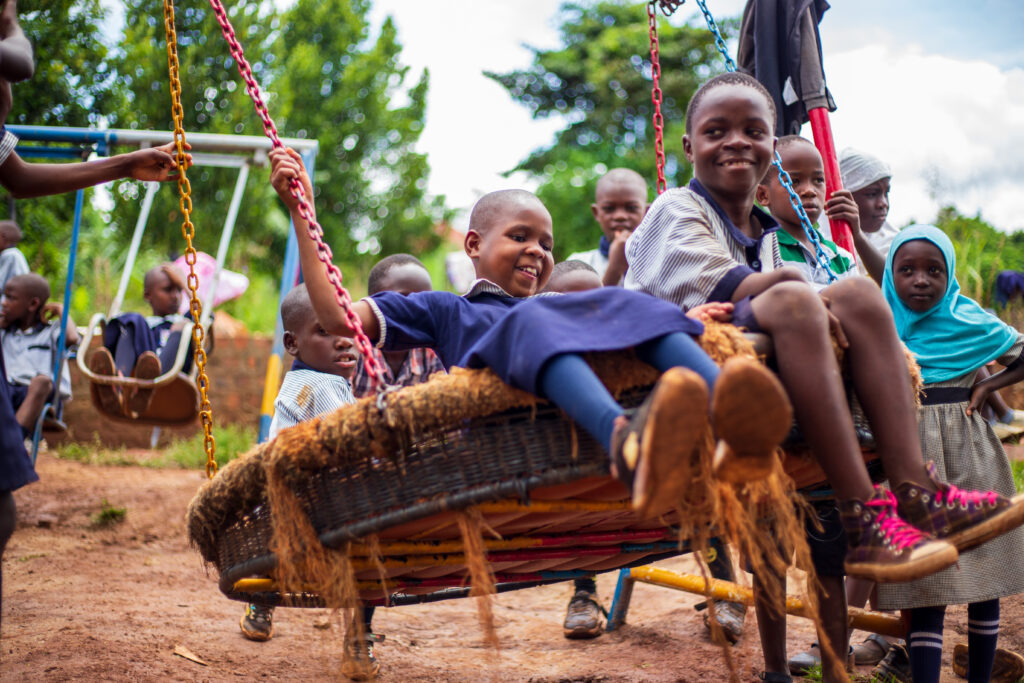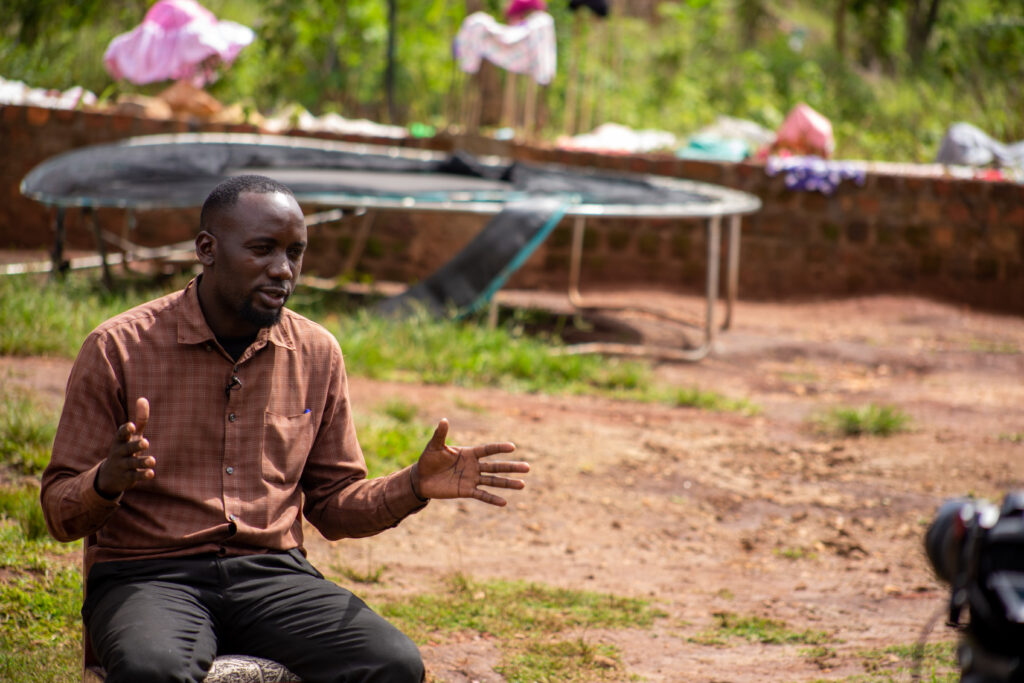Thriving together:
Community School Pioneers Sustainable Learning Model for Children With Special Needs
Written by: Rhonet Atwiine. Film and Photography: Richard Mugambe, Moses Sserunjogi.
Written by: Rhonet Atwiine. Film and Photography: Richard Mugambe, Moses Sserunjogi.
At Wisdom Hub Nursery and Primary School, two in every five of its close to 100 learner population has some form of disability.
The school, a private social enterprise in the community of Katende, in Mpigi district about 40 kilometers outside Uganda’s capital Kampala is one of its kind in the country where discriminatory social beliefs hold back children with special needs from going to school.
Anna Nasirundi enrolled her now eight-year-old daughter at the school in 2022. The child, born with partial paralysis, had been withheld from learning.
“We thought she could never read or write. However, I felt that my child deserved the same opportunities as any other child,” she said, adding that “I wanted my daughter to be capable of navigating life on her own.”

Anna Nasirundi shares with Solutions Now Africa about how her child has improved at Wisdom Hub school. Photo by Moses Sserunjogi.
The child has been a quick learner, and has passed well to join primary two. She is dreaming to be a future doctor.
This school uses what it terms as “we do, you do, I do model” which entails collectively working on learning tasks, then later progressing into individual work.
According to Agness Ninsiima, a Mathematics teacher who has been personally close to Nasirundi’s child, the model creates more time and attention to a special needs child from the teacher to fellow learners.
“As a teacher, I begin by demonstrating an activity on the blackboard, ensuring that all students can follow along. Then, we collectively engage in the activity, with a student taking the lead. Finally, I assign the task for pupils to complete independently, ensuring active participation from every child.” she elaborates.

Children play together during a classroom break at Wisdom Hub School. Photo by Moses Sserunjogi.
A World Bank special needs factsheet suggests that about 16% of children in the country have a form of disability. However, most of them are not able to attend school, while those that attend fail to transition from one educational level to another.
Whereas the Ministry of Education and Sports says all the 21,000 schools in Uganda practice Inclusive Education by admitting learners, physical capacity, infrastructure, and learning materials, inadequate teacher capacity and negative attitudes and stigma impede children with disability from attending school.
According to Sarah Bugoosi, the Commissioner for Special Needs and Inclusive Education at the Ministry of Education and Sports, the government is making attempts at newer measures and programs tailored to support students with diverse learning needs in public schools.
“We have established four regional special needs education schools: one in Gulu for children with physical disabilities, Mukono for children with visual impairments, and two secondary schools for the Deaf in Wakiso and Mbale Districts,” she elaborates.
However, despite these efforts, numerous challenges persist in implementing this policy, including inadequate funding, a shortage of trained teachers, and negative societal attitudes towards individuals with disabilities.
“In the past, with support from the Danish International Development Agency (DANIDA), we could enhance teacher capacity through short-term courses. Currently, we lack such resources. It’s essential for the government to prioritize funding for effective teaching and learning for students with special needs, ” Bugosi notes.

Children pause for a photo moment outside the classroom. Photo by Moses Sserunjogi.
Uganda’s education sector has been greatly supplemented by private players because of challenges of budgetary funding gaps.
However, when it comes to learners with special needs, private entities trail as much as public schools in creating inclusive learning environments.
“Many private schools struggle to include children with disabilities, fearing financial repercussions. Also some parents resist their children learning alongside those with special needs,” says Moses Walusimbi explaining why he started the Wisdom Hub Primary School.
Driven by the mission of cultivating, and nurturing an inclusive environment for every child to thrive, the school operates on a model where children with special needs are enrolled alongside those abled differently to learn in the same class as their support system.
In the classroom the children are taught to embrace diversity “as a way of developing a community that looks at people equally despite their conditions” according to Walusimbi.
Walusimbi opened doors at the Wisdom Hub in 2013, and has seen over 300 children that have crossed into secondary school despite their disabilities such as autism, cerebral palsy, limb length discrepancies, hearing impairment, and other physical challenges.
These children here hail from diverse regions across the country, including the central, northern, western, and eastern areas.

Moses Walusimbi engages learner Ronald Mumbere. Photo by Moses Sserunjogi.
Ronald Mumbere, a third-grade pupil at the school hails from the Southwestern district of Kasese with a condition called limb length discrepancy, where one arm is shorter than the other.
He had required special assistance which he could get in his home district. At the school, he has received the support he needed and an enabling environment.
“Being here feels like being at home. I’ve learned shading, numbers, writing, and reading. My friends lift me onto the swings and help me play. Whenever I ask for help, no one refuses to assist me with my work. They patiently discuss areas I haven’t grasped yet. They also make sure I get my breakfast and lunch,” he relates.
Sophia Nabakiibi, is among those who study alongside children like Mumbere. She notes that there’s no distinction in sharing with children who have special needs because “we are all children, and they are my friends.”
“I share everything I have with them. I give them my pens, pencils, and books, and help explain anything they didn’t grasp well in class. During lunchtime, I ensure those without hands receive food so we can all eat together and return to class,”she shares warmly.

Teacher Agnes Ninsiima speaks to Solutions Now Africa reporter Rhonet Atwiine. Photo by Moses Sserunjogi.
Lawrence Mukiibi, the Dean of Studies at the school says apart from allocating extra time they provide learning aids such as flashcards, offer tangible examples relevant to the child’s experiences, and encourage the creation of picture stories to enhance their cognitive abilities and comprehension in class.
Assessing the overall school performance, Mukiibi deems it “good.” He observes that students without special needs generally outperform those with such requirements due to their circumstances.
However, he highlights ongoing improvement in this aspect annually.
He emphasizes the importance of resilience as teachers, particularly when dealing with the unique behaviors of children with special needs.
“Besides their learning pace, there are instances where their actions may seem unconventional. For instance, they might laugh out loud or repeat after me during lessons. In such situations, it’s crucial not to react with frustration or punishment. Instead, we embrace their contributions and find ways to engage them positively in the classroom.” he explains.
Aside from education, the school offers tailored assistance to children with disabilities through various intervention programs. These include nutrition initiatives for those facing malnutrition, therapy sessions including physiotherapy, speech, and occupational therapy.
However, as the school makes effort, the odds against the implementation of an inclusive education are diverse and need a complete system re-examination.

Wisdom Hub Headteacher Julius Kazibwe. Photo by Moses Sserunjogi.
Wisdom Hub Headteacher Julius Kazibwe for example notes that the current school curriculum is not designed to accommodate the pace at which children with special needs adapt to learning.
“Providing them special attention in itself may slow down the implementation of the school curriculum and therefore requires that necessary adjustments to ensure that all learners are incorporated,” he says.
Slow as it seems, for Nasirunda, the approach has offered her daughter an opportunity to reimagine life as a child and make much of it.
“Being in a school where she interacts with children of all abilities has been beneficial. She has learned to adapt quickly, improving her communication skills, and mastering household tasks such as sweeping, cooking, washing dishes, and mopping. Most importantly, she’s gaining confidence in herself with each passing day. I’m proud of the young woman she’s evolving into,” Nasirundi remarks.
© 2022 - Media Challenge Initiative | All Rights Reserved .
© 2022 - Media Challenge Initiative | All Rights Reserved .